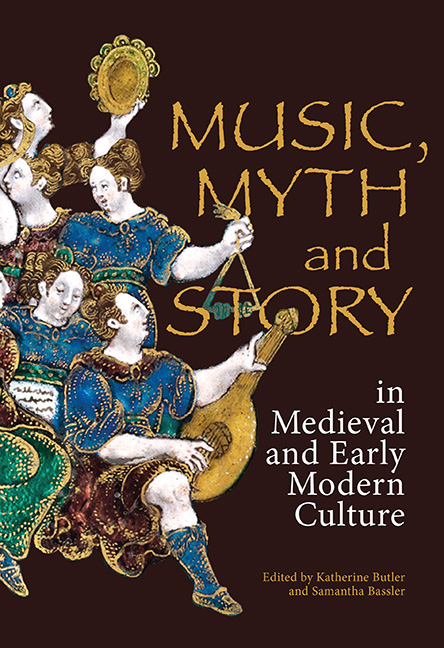Book contents
- Frontmatter
- Contents
- List of Illustrations
- List of Contributors
- Editors’ Note
- Introduction
- I MYTH IN MEDIEVAL MUSIC THEORY AND PHILOSOPHY
- II ICONOLOGIES OF MUSIC AND MYTH
- III MYTHS IN RENAISSANCE PHILOSOPHIES OF MUSIC
- 6 Marsilio Ficino and Girolamo Cardano under Orpheus's Spell
- 7 Origin Myths, Genealogies and Inventors: Defining the Nature of Music in Early Modern England
- IV MYTH AND MUSICAL PRACTICE
- V NARRATIVES OF PERFORMANCE
- VI MYTH AND MUSIC AS FORMS OF KNOWLEDGE
- VII RE-IMAGINING MYTHS AND STORIES FOR THE STAGE
- Bibliography
- Index
- Studies in Medieval and Renaissance Music
6 - Marsilio Ficino and Girolamo Cardano under Orpheus's Spell
from III - MYTHS IN RENAISSANCE PHILOSOPHIES OF MUSIC
Published online by Cambridge University Press: 24 October 2019
- Frontmatter
- Contents
- List of Illustrations
- List of Contributors
- Editors’ Note
- Introduction
- I MYTH IN MEDIEVAL MUSIC THEORY AND PHILOSOPHY
- II ICONOLOGIES OF MUSIC AND MYTH
- III MYTHS IN RENAISSANCE PHILOSOPHIES OF MUSIC
- 6 Marsilio Ficino and Girolamo Cardano under Orpheus's Spell
- 7 Origin Myths, Genealogies and Inventors: Defining the Nature of Music in Early Modern England
- IV MYTH AND MUSICAL PRACTICE
- V NARRATIVES OF PERFORMANCE
- VI MYTH AND MUSIC AS FORMS OF KNOWLEDGE
- VII RE-IMAGINING MYTHS AND STORIES FOR THE STAGE
- Bibliography
- Index
- Studies in Medieval and Renaissance Music
Summary
THE myth of Orpheus has cast a spell on some Italian Renaissance philosophers that is quite difficult to explain. To explain why they were so fascinated by Orpheus as a historical and mythological character, in this chapter I propose that precisely because of his elusive character, Orpheus could be used as a model to shape diverse, innovative theories about the relationship between God, nature, history, man, music and creativity.
I begin with the place of Orpheus in Marsilio Ficino's Timaeus commentary (1484/96). Ficino used Orpheus to dissolve temporal and cultural discrepancies between pagan philosophy and Christian thought. In line with some of his ancient and medieval predecessors, Ficino saw Orpheus as one of the earliest prophets and the founding father of Orphism, a religious cult concerned with the mysteries of the cosmos and with the secrets of the afterlife. In order to be able to reveal these secrets, Ficino stressed that the implication of the myth was that music possessed the power to alter the nature of all parts of the Creation to the extent of even conquering death.
The second part of this chapter contrasts Ficino's interpretation of Orpheus with that of Girolamo Cardano's De tranquillitate (On Tranquillity, 1561). Cardano made the search for the secret behind those extraordinary lost powers of Orphic music one of the main themes of his musical thought. Although inspired by Ficino's philosophy, Cardano departs strikingly from his famous predecessor in seeing Orpheus above all as a mythical, secular hero, and interpreted the famous myth of the power of his music through the lens of Aristotelian philosophy.
Both case studies demonstrate how the myth of Orpheus in the Italian Renaissance functioned as a justification of new intellectual and aesthetic standards that emerged in Italy from the end of the fifteenth century onwards. In these new philosophies, Orpheus played an important role: he testified to the new powers attributed to words and music in Italian Renaissance philosophy and music theory as vehicles of the healing and enlightening power of music.
MARSILIO FICINO
Ficino's philosophy is closely connected with music and theology, and therefore the myth of Orpheus seems to fit his philosophy very well.
- Type
- Chapter
- Information
- Music, Myth and Story in Medieval and Early Modern Culture , pp. 107 - 123Publisher: Boydell & BrewerPrint publication year: 2019

